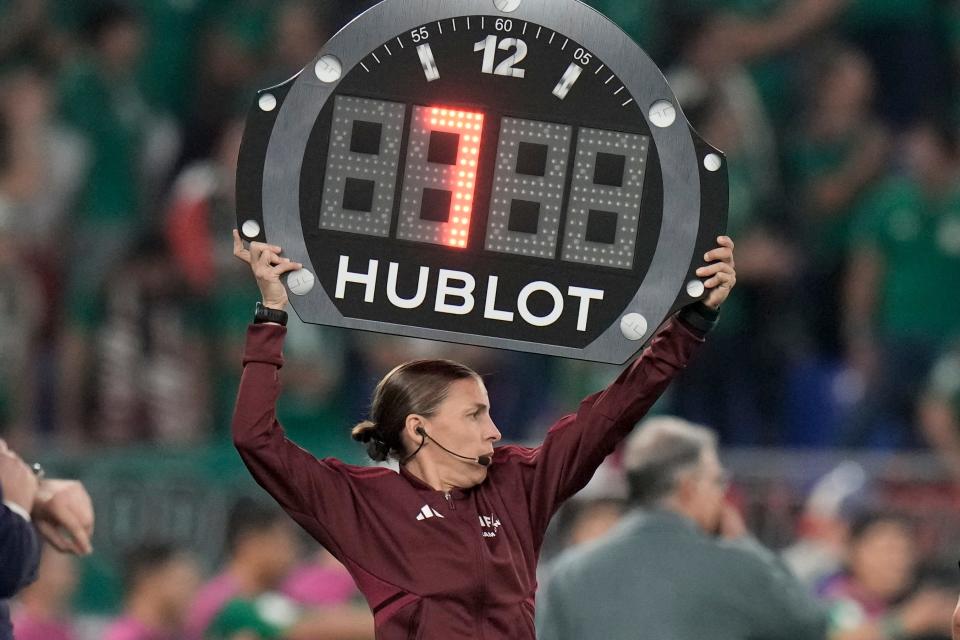What is stoppage time? Here's why World Cup has so much extra time added
In a time where numerous sports leagues are trying to shorten the length of their games, FIFA is adding time to its World Cup matches in record fashion.
There's been an unprecedented amount of stoppage time added in Qatar, highlighted by England and Iran playing in the longest World Cup group stage match in the tournament's history with a total time of 117 minutes. That was aided by the first half of the match having 14 minutes of extra time, followed by 13 minutes in the second half of England's 6-2 victory, each of which were record's for stoppage time in World Cup history, according to statistics site Opta Joe. Nearly 14 minutes were added to the second half of Saudi Arabia's stunner against Argentina, and nine minutes were added to the second half of the U.S. victory over Iran to advance to the knockout rounds.
But what is stoppage time, how does it work and why is so much being added to this World Cup? Here's what to know:
FOLLOW EVERY MATCH: Live World Cup scores
FIFA WORLD CUP: How does the tournament work? The ultimate soccer showcase, explained

What is stoppage time?
Soccer match are 90 minutes long, comprised of two 45-minute halves. But how it differs from sports like basketball and American football is the clock counts up instead of down, and it never stops. So if the ball goes out of bounds or players are lining up for a penalty kick, the clock continues.
That's where stoppage time, also known as added or injury time, comes into play. Once each half gets to the 45 minute mark, stoppage time is added. Typically, there's at least one minute added to each half.
Stoppage time also is added to each of the two extra time periods in the knockout stages of the World Cup.
WHAT IS OFFSIDE IN SOCCER?: Explaining the rule so you're prepared to watch the 2022 World Cup
WHAT HAPPENS WHEN THERE IS A TIE?: FIFA World Cup extra time and penalty shootouts, explained
How does stoppage time get decided?
There are numerous factors taken into account of how much stoppage time will be added, all decided by the head official on the field.
Reasons for stoppage time include, but are not limited to:
Injuries
Substitutions
Players lining up for out of bounds throw and free, corner, goal or penalty kicks
Referees issuing yellow or red cards
Goal celebrations
Video assistant referee stoppages
Other delays like water breaks due to high temperatures
When there is a delay in play, the head referee keeps track of how long it lasts. Then when the half nears the mandated 45 minutes, the head referee communicates the total amount of lost time to the side official, who displays the number of added minutes on a digital board for the players and coaches to see.

WHAT IS A YELLOW CARD IN SOCCER?: How players get red cards, suspensions in World Cup, explained
Why is so much stoppage time added during the 2022 World Cup?
Before any matches were played, FIFA made it a point of emphasis to its referees that it wants more activity to happen on the field.
"The purpose is to offer more show to those watching the World Cup," FIFA referees committee chairman Pierluigi Collina said ahead of the tournament, according to the Associated Press.
Collina added referees have been instructed to keep track of all delays in the game in an effort to maximize the amount of effective game play. This comes after Soccer Metrics Research found the average amount of effective playing time in the 2018 World Cup was between 52 to 58 minutes, much lower than the 60 to 67 minutes range at the 2014 World Cup.
Referees are also taking into account any delays that happen during the stoppage time, further adding more extra time that indicated by referees.
As a result, five of the longest stoppage times added to a half in World Cup history have happened this year, according to Opta Joe.
Contributing: Associated Press
Follow Jordan Mendoza on Twitter: @jordan_mendoza5.
This article originally appeared on USA TODAY: World Cup stoppage time: Here's why time is added to end of games

 Yahoo Sports
Yahoo Sports 